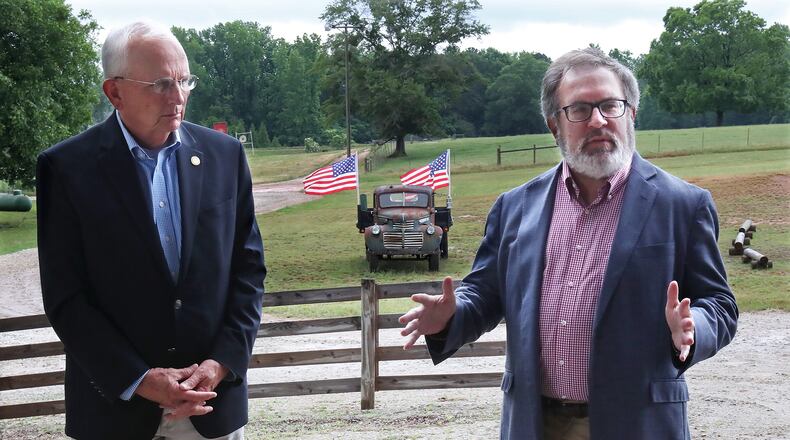The head of the federal Environmental Protection Agency is touring metro Atlanta this week, meeting with local farmers and visiting area sites that have received federal grants for cleanup and redevelopment.
>> Read More: Atlanta, Albany awarded federal Brownfields cleanup grants
Administrator Andrew Wheeler will also meet with the agency’s regional employees to emphasize their role in supporting communities and helping those communities understand the EPA’s role, he said.
“When EPA steps in and we help a community, we can make a real difference in people’s lives,” said Wheeler in an interview with The Atlanta Journal-Constitution.
Wheeler’s two-day visit — his first outside of the nation’s capital since the onset of the pandemic — began Wednesday with a stop at Southern Belle Farm in McDonough, where he spoke about efforts the EPA is making to support farmers.
During the COVID-19 pandemic, farmers nationwide have taken a hit as disruptions in the food supply chain have made it difficult to get products to market. The EPA has helped by aiding cattle farmers in managing food waste, Wheeler said. The agency has also continued its review of hotly debated pesticides such as dicamba, Wheeler said. “It is important to keep a wide portfolio of pesticides available,” he said. “You hear complaints that we just rubber-stamp pesticide applications. We don’t. We take a hard look at the restrictions on the use.”
This year marks the 50th anniversary of the agency established in 1970 by President Richard Nixon to address the environmental responsibilities of the federal government. The EPA has been criticized in recent years for reversing a number of environmental policies. A recent analysis by The New York Times found more than 60 environmental rules reversed, revoked or weakened under the current administration with more than 30 rollbacks in progress. The regulatory changes touch on everything from air and water pollution to infrastructure and planning. Environmental groups and some states have been battling many of those changes with lawsuits in federal courts.
Wheeler discussed one of those policies Wednesday.
The Navigable Waters Protection Rule, which takes effect on June 22, revises the definition of navigable waters, which are federally protected under the Clean Water Act. “This rule gave greater certainty to states and landowners and especially farmers who have suffered for generations with uncertainty over what exactly constitutes a navigable water,” Wheeler said to the crowd on Wednesday.
Environmental advocates say those changes allow for unchecked pollution in the nation’s waterways. Blan Holman, leader of the Southern Environmental Law Center’s Clean Water Defense Initiative, said the rule would be “the biggest rollback in the history of the Clean Water Act,” gutting protections that have been in place since the Nixon era.
“The federal government shouldn’t step in and try to protect every last single piece of wetlands or waterways across the country,” Wheeler said.
Locally, EPA employees have been teleworking during COVID-19 (about 40 EPA employees throughout the country have been sickened by the virus, Wheeler said), but some workers have remained on site for projects that pose a risk to environmental and human health, such as lead removal on Atlanta’s Westside. The area was listed as a Superfund site — a site where contamination would require federal assistance for long-term cleanup — after an Emory student shared data with the EPA showing elevated lead levels in soil samples. Workers have continued to remove contaminated soil from 113 properties with 15 properties completed and three in progress as of late April.
>> RELATED: EPA targets lead contamination in Georgia schools, homes
Wheeler said the EPA has also continued to work on issues specifically related to the pandemic, including approving the use of more than 400 disinfectants that can be used in homes, offices and workplaces to kill COVID-19. The agency has worked to ensure drinking water and wastewater systems around the country are not disrupted by the pandemic, Wheeler said. Though some utilities have had trouble acquiring needed chemicals, the EPA worked to help them get the proper supplies. “Nowhere in the country has anyone’s water been impacted because of COVID-19,” he said.
On Thursday, Wheeler will make appearances at the Procter Creek Watershed and Pratt Pullman District, the 27 acres in Kirkwood scheduled for redevelopment as an entertainment district. The project, located on a former rail yard, has received a $300,000 federal Brownfields environmental grant for decontamination.
About the Author
Keep Reading
The Latest
Featured





